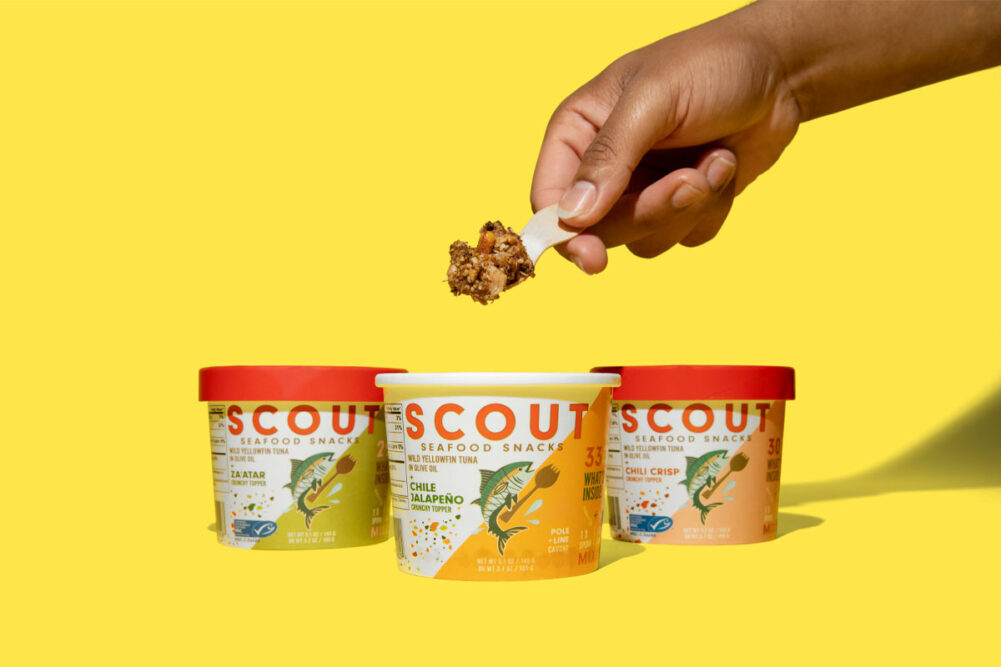 VANCOUVER, BC. — Earlier this year, seafood startup Scout Canning Inc. introduced a snackable spin on the tinned fish trend. The product launch is part of the brand’s broader efforts to elevate Americans’ perceptions of the pantry staple.
VANCOUVER, BC. — Earlier this year, seafood startup Scout Canning Inc. introduced a snackable spin on the tinned fish trend. The product launch is part of the brand’s broader efforts to elevate Americans’ perceptions of the pantry staple.
TikTok content creators are credited with sparking a recent canned seafood craze, alongside a wave of specialty brands and European conservas appearing on supermarket shelves and tapas bar menus. Sales of canned seafood rose 10% to $2.7 billion in the United States last year, per Euromonitor International.
“Because tinned fish has been around for over 120 years, it’s not going anywhere, but … it has the limelight and all of this attention from millennials and Gen Zs across social media,” said Adam Bent, co-founder and chief executive officer of Scout Canning. “I think it’s more than a trend. It’s reached a level of cultural relevance and acceptance and adoption in the US market. And we’ll start to finally see consumers shopping more than just tuna, looking for other species, looking at other producers and also associating it as a higher-value product, not something that should cost $1 or $2 that you throw in your pantry and pull out on a rainy day for a sandwich.”
Nearly a decade ago, Canadian chef Charlotte Langley began tinkering with a century-old canning machine, developing recipes inspired by the tradition of preserving seasonal catches in coastal fishing communities. Four years later, she partnered with operations experts Mr. Bent and a third co-founder, Nate Dunn, to commercialize her vision for a responsible seafood brand with culinary flair. Scout debuted its initial range of canned seafood three years ago, scrapping plans amid the pandemic to launch at cocktail and wine bars as a “primary focus,” Mr. Bent said.
“We had to really switch gears … knowing that we had basically lost foodservice and hospitality as an entire segment we were initially focused on,” he said.
The company’s canned line includes tuna, salmon, lobster, mussels and trout sustainably sourced from North American producers. The latest addition, a range of grab-and-go seafood snacks, combines yellowfin tuna in olive oil and a packet of crunchy toppings, featuring seeds, nuts, herbs and spices.
“We’re not a tuna brand,” Mr. Bent said. “Actually, when we launched, initially we were never going to do tuna or salmon because they’re widely available from a lot of brands and are the most overfished and overfarmed species. But flash forward a year and a half in the business, we’re like, okay, if we’re going to reach households and introduce them to Scout, then we’re basically chopping off our leg by not offering them tuna, which is a lot of entry point to the category.
“And if we’re going to shift behaviors in how a lot of US consumers shop tinned fish, we need to meet them where they’re at with tuna, and then use that as a guiding point to bring them along this journey to other species, which are just as delicious and more responsible.”
The team aimed to create a convenient offering that stood out among the traditional tuna salad kits packed with crackers while tapping into a “seacuterie” board movement on social media, Mr. Bent said, noting the separately packaged mix-ins presented a solution for increasing operational efficiency “by not having to cook them in the can, but also bringing this whole other textural element to tuna fish … that you don’t get when you cook other things into the tin.”
Scout seafood snack kits include a bowl and spork. Varieties are chili crisp, which includes a spicy, savory and slightly sweet mixture of chili peppers and aromatics; chile jalapeño, which is a nod to the variety of chilies and flavors of Mexico where Scout’s yellowfin tuna is sourced; and za’atar, which features a blend of spices from the Middle East.
By the end of this year, Scout’s canned seafood or snack kits will be available in 7,000 retail stores, including Whole Foods Market, Sprouts Farmers Market, Albertsons and others, said Mr. Bent, who described the brand as “accessible premium.”
“I think we have the same product quality, high sourcing standards, and that culinary halo that we bring forward to the category, but we are a bit more affordable in price point and more approachable for the average US consumer, who is going to dip their toes into tinned fish,” he said. “We make a lot more sense than them going and spending $15 on a Galician mussel from Spain in fancy packaging and language they can’t read.”
A Certified B Corporation, Scout Canning contributes a portion of revenue to support ocean health projects and is committed to sourcing a variety of species that are deemed regenerative and abundant by third-party authorities, according to the company.
“Driving innovation with tuna is a means to an end for us,” Mr. Bent said. “I’d love to see by 2025 that Scout has trout and other types of … mollusks or mussels in seafood snack format, which makes it more approachable for the average US consumer.
“I really believe in this kit format. I think even though our craft cans are wildly popular with a younger demographic and people who like to cook and appreciate food, we really need to reach the tuna households that only ever consume tuna from the category. And if we can get them to move to other species, we kind of have to do the work for them.”
With the snack kits, he said, “we’ve basically squashed all of the barriers to entry for tinned fish.”
Enjoying this content? Learn about more disruptive startups on the Food Entrepreneur page.





